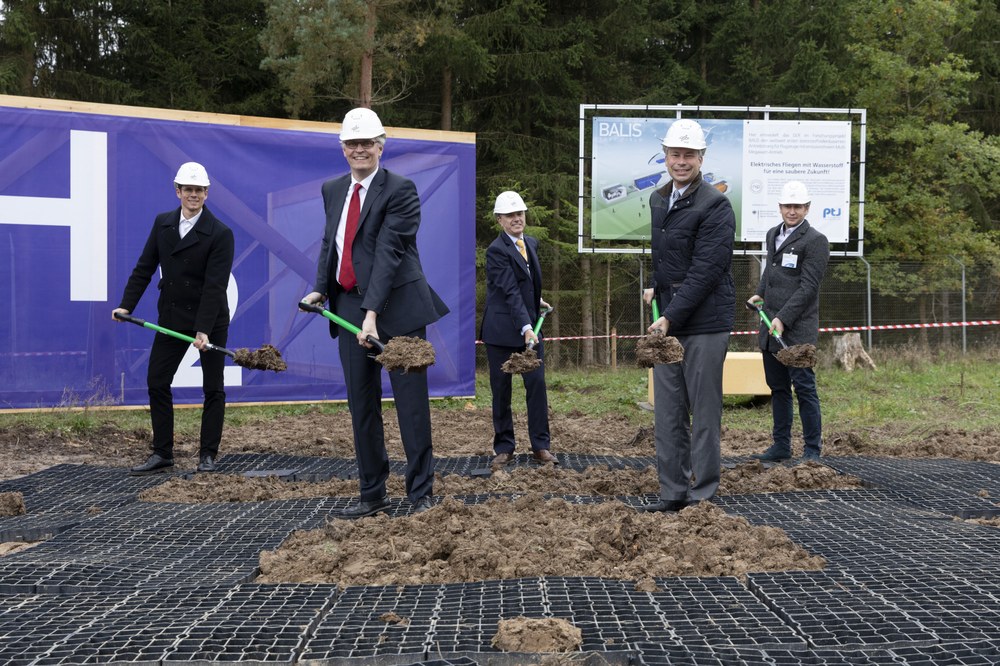Fuel cells for air transport – ground-breaking ceremony for the BALIS test field in Empfingen


- DLR is constructing a unique test field as part of the BALIS project. It will be used to develop and test fuel cell propulsion systems for various modes of transport.
- The focus is on fuel cells with an output of approximately 1.5 megawatts.
- The ground-breaking ceremony for the BALIS test field took place on 6 October 2021 at the Innovation Campus in Empfingen.
- Commissioning is expected to begin in autumn 2022.
- Focus: Transport, aeronautics, energy, hydrogen, emission-free flight, fuel cell technology
The German Aerospace Center (Deutsches Zentrum für Luft- und Raumfahrt; DLR) is constructing a globally unique test field on the Empfingen Innovation Campus in the northern Black Forest to develop and test fuel cell propulsion systems for various modes of transport, including aircraft. The ground-breaking ceremony for the new test field took place on 6 October 2021, with representatives from government, administrative bodies and industry in attendance.
New generation of fuel cell systems to enable zero-emission takeoff
The BALIS project, led by the DLR Institute of Engineering Thermodynamics, focuses on fuel cell systems with an output of approximately 1.5 megawatts. These will make it possible, for example, to build a regional aircraft with between 40 and 60 seats and a range of 1000 kilometres. The complex BALIS test infrastructure models the complete system, meaning all the hardware and the necessary infrastructure. This includes the fuel cell system itself, the hydrogen tanks, the electric motors and the control and monitoring technologies. The test field will enable research and development work under a wide range of conditions, requirements and guidelines. In addition to setting up and operating the test field, DLR is also developing and testing its own fuel cell system as part of the BALIS project.
"Today's ground-breaking ceremony lays the foundation for a highly innovative test field that will allow the development of key components for zero-emission flight. This makes BALIS a very special project and an important step towards commercial passenger aviation with hydrogen and fuel cells," explained Steffen Bilger, Parliamentary State Secretary at the German Federal Ministry of Transport and Digital Infrastructure (Bundesministerium für Verkehr und digitale Infrastruktur; BMVI).
"Fuel cells are an important technology for enabling zero-emission flight. With the BALIS test field, a unique infrastructure is being created to further develop aircraft with this technology," said Karsten Lemmer, Member of the DLR Executive Board responsible for Innovation, Transfer and Research Infrastructure. “There is already a great deal of interest from industry, and we are in contact with major aircraft manufacturers, start-ups and component manufacturers in the fields of fuel cells, electric motors, hydrogen tanks and power electronics."
Initial research projects from 2023, and testing of complete propulsion systems from 2024/25
The test field is being constructed on an undeveloped site with an area of approximately 2000 square metres on the Empfingen Innovation Campus. It consists of seven specially designed and equipped laboratory units. Commissioning of the research infrastructure is expected to begin in autumn 2022 and will take around nine months. According to current plans, sub-areas of the field, particularly those relating to fuel cells and electric motors, will be ready for initial research and development projects as early as the beginning of 2023. It will be possible to test complete propulsion systems from 2024/25. A small number of research and technical support staff from the DLR Institute of Engineering Thermodynamics will be constantly on site to set up and operate the field.
"The Innovation Campus offers ideal conditions for implementing the test field quickly and advancing the associated research topics. It also offers plenty of space, excellent infrastructure with scope for expansion, and easy accessibility from the Institute’s main site in Stuttgart," said André Thess, Director of the DLR Institute of Engineering Thermodynamics, summarising the factors that led to selecting Empfingen as the location for the test field. DLR already has a presence at the Innovation Campus in the form of the spin-off msquare and a research observatory that is scheduled to open in spring 2022.
BALIS project funding and coordination
The BALIS project is being funded with 26 million euro by the German Federal Ministry of Transport and Digital Infrastructure (BMVI) as part of the National Innovation Programme Hydrogen and Fuel Cell Technology (NIP) and financed through the Energy and Climate Fund. The funding programme is being coordinated by the National Organisation for Hydrogen and Fuel Cell Technology (Nationale Organisation Wasserstoff- und Brennstoffzellentechnologie; NOW) and implemented by Project Management Jülich (Projektträger Jülich; PtJ).
